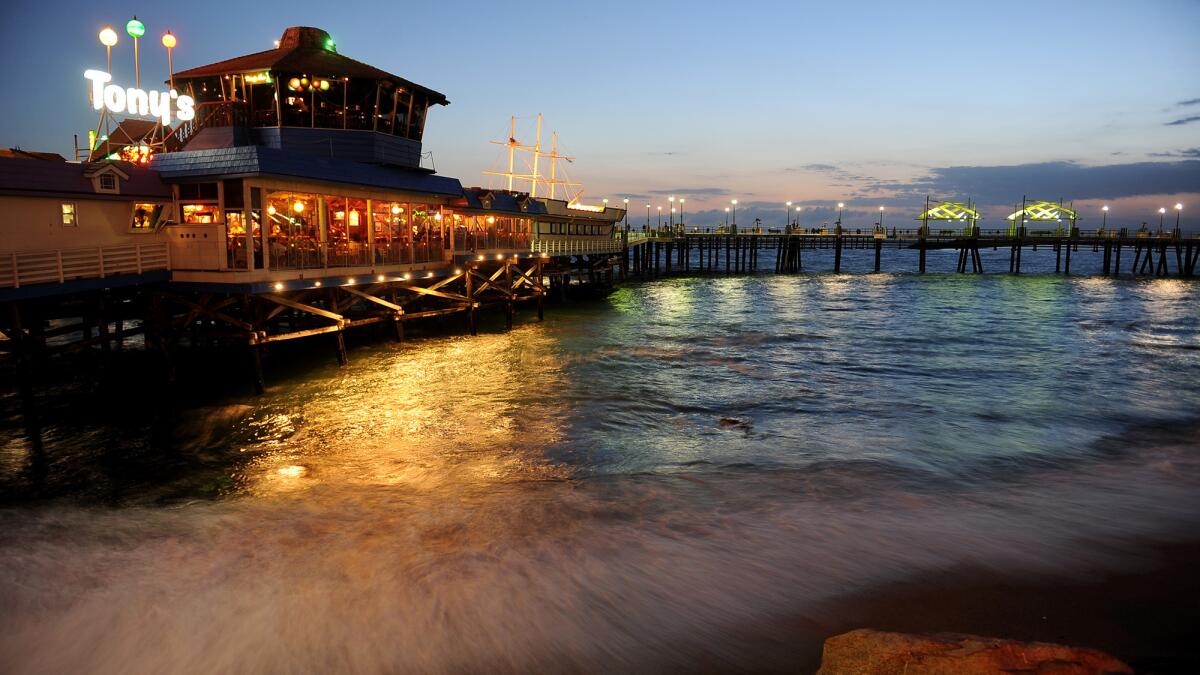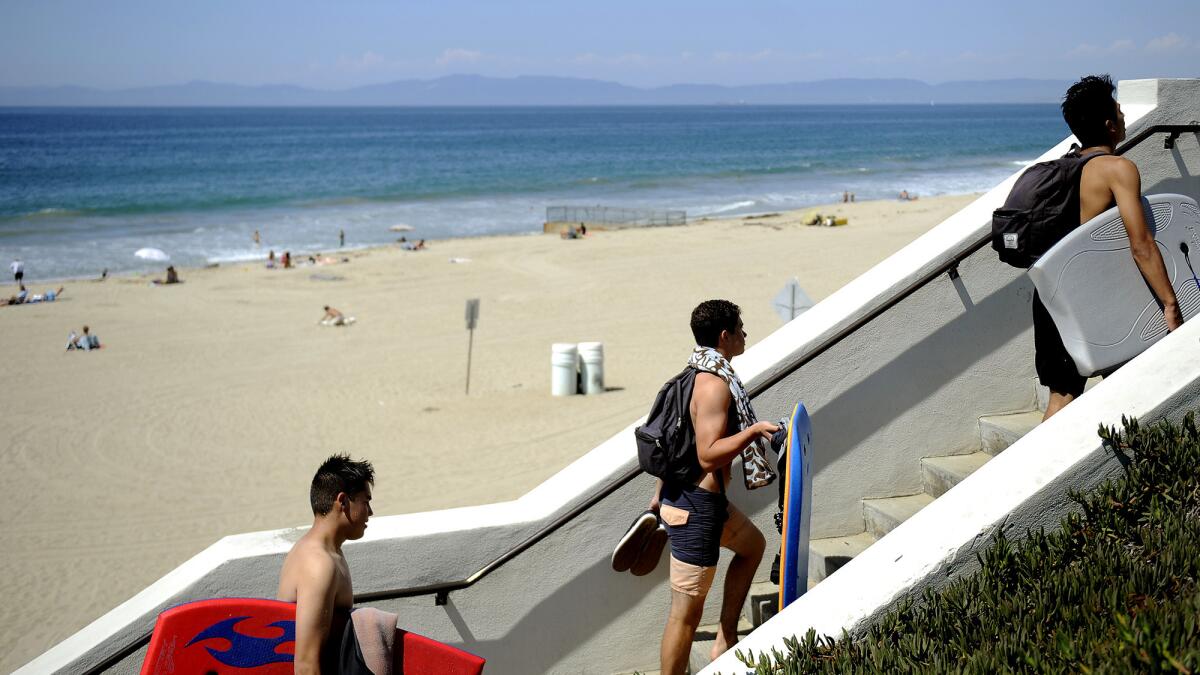Neighborhood Spotlight: Redondo Beach, though pricey, is not quite a South Bay A-lister

- Share via
For the millions of tourists and Southern Californians who visit Redondo Beach to surf, shop or just stroll down the Esplanade, the appeal of the city as a resort town is readily apparent. What many don’t realize is that for much of Redondo’s early history, its bustling tourism trade existed side by side with heavy industry and a busy cargo port.
Although the first hints of its industrial future came with the founding of the Pacific Salt Works on the shores of a large salt lake in the area in 1854, the development of Redondo Beach actually began in earnest in 1887. That year, the sisters Dominguez sold a portion of the 75,000 acres of coastal land that had been granted to their great-grandfather by the Mexican government to real estate developers eager to cash in on the South Bay’s nascent tourism industry.
Unfortunately for them, buyers’ interest in beachfront property in the then-remote wilderness north of the Palos Verdes Peninsula was tepid at best. Oregon steamship magnate John C. Ainsworth, searching for a port through which to ship lumber from the Pacific Northwest to the booming new cities of the Southwest, snapped up the land.
Timber mills were built to fashion Oregon evergreens into two-by-fours, and railroad lines were laid to ferry the freshly milled wood across the basin to build the grand homes and shopping blocks of Victorian Los Angeles.
At the same time, the city began its push to become a tourist destination. The first toehold of the hospitality industry in town was the legendary Hotel Redondo, a massive Victorian-style resort for the well-to-do, with an adjacent tent city that provided cut-rate lodgings for the less well-to-do who wished to bask in its reflected glory.

The hotel was a hit and was soon followed with a plunge, a pleasure pier and a hippodrome. Train lines and Red Cars connected Redondo to L.A., drawing visitors from all around to loll on its beaches.
The twin economic engines of lumber and tourism drove Redondo’s growth for the next 30 years, until in 1926 residents weary of the unsightliness of the oceanfront timber operations forced the town to deny an extension of Pacific Electric’s lease on its lumber wharf, bringing an effective end to an era.
The Depression would see Redondo Beach’s reliance on tourist dollars sorely tested as financially strapped Americans stayed home in droves, but the postwar boom years brought people back to surf, swim and — for many of them — to stay for good.
Neighborhood highlights
The endless pier: Redondo’s unique triangular pier, which is actually the second iteration of the landmark, still anchors a lively dining and entertainment district.
Surfing USA: Name-checked by the Beach Boys for its longboarding scene more than half a century ago, Redondo Beach is still a popular spot for surfers.
Set sail: Redondo’s marina offers dining, a protected swimming lagoon and paddleboard rentals, in addition to permanent and overnight anchorage for sailboats and yachts.
Neighborhood challenge
South Bay living, South Bay prices: Although not as expensive as neighboring Hermosa Beach and Manhattan Beach, Redondo is still a pricey market.
Expert insight
Greg Geilman, the managing director of the Domo Group, an affiliate of RE/MAX Estate Properties, has been living and working in Redondo Beach for a decade. He said that there’s a distinct difference between the neighborhood’s north and south sides but that both offer advantages.
“South Redondo tends to be more desirable because of its proximity to the water,” Geilman said. “But the north side offers plenty of tall-and-skinny homes with more affordable prices.”
In addition to the pier and its bevy of restaurants, Geilman mentioned a few other highlights. In the beachfront community of Hollywood Riviera, there are views of the Queen’s Necklace, a stretch of homes along the bay whose lights “shine like jewels,” Geilman said.
“Redondo Beach is a hidden gem,” he said. “It’s often overlooked because of Manhattan Beach and Hermosa Beach, but it’s a beautiful beach town full of cute homes and great views.”

Market snapshot
Redondo Beach is split into two ZIP Codes. In the beachfront area, 90277, based on 12 sales, the median sales price for single-family homes in February was $1.433 million, up 7.8% year over year, according to CoreLogic.
In northern Redondo Beach, 90278, based on 22 sales, the median sales price for single-family homes in February was $1.02 million, a 17.2% increase year over year.
Report card
Of the 13 public schools within the Redondo Beach boundaries, Alta Vista Elementary scored the highest on the 2013 Academic Performance Index at 943.
Other highlights include Jefferson Elementary, which scored 935, and Birney Elementary, which scored 914. The area’s public high school, Redondo Union High, scored 856.
Times staff writer Jack Flemming contributed to this report.
MORE FROM HOT PROPERTY:
Akiva Goldsman’s Old World estate charms a buyer in Beverly Hills Post Office area
Tyra Banks flips Pacific Palisades town home back on the market
Rooney Mara reintroduces her restored Midcentury home in Los Feliz at $3.45 million
Former Men’s Wearhouse CEO George Zimmer sells Hawaiian haven at a steep discount
More to Read
Sign up for Essential California
The most important California stories and recommendations in your inbox every morning.
You may occasionally receive promotional content from the Los Angeles Times.






